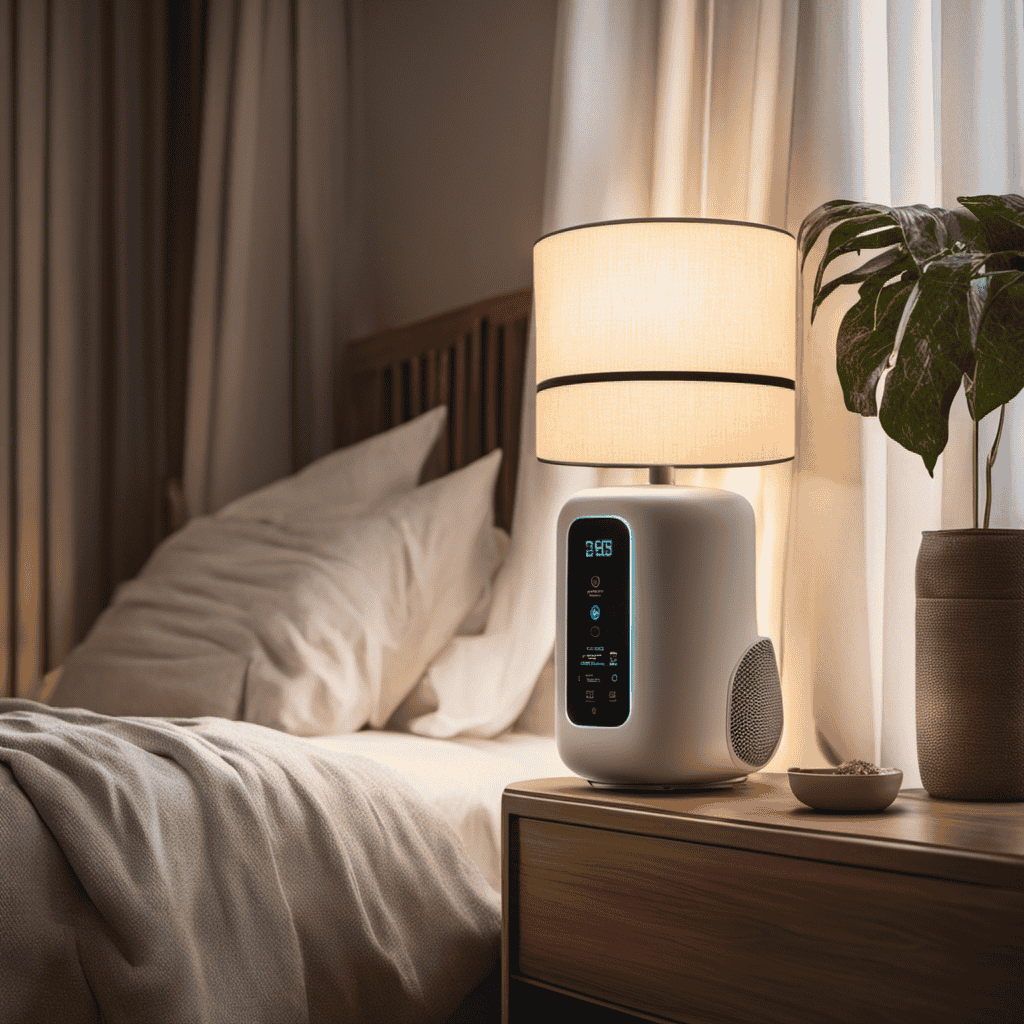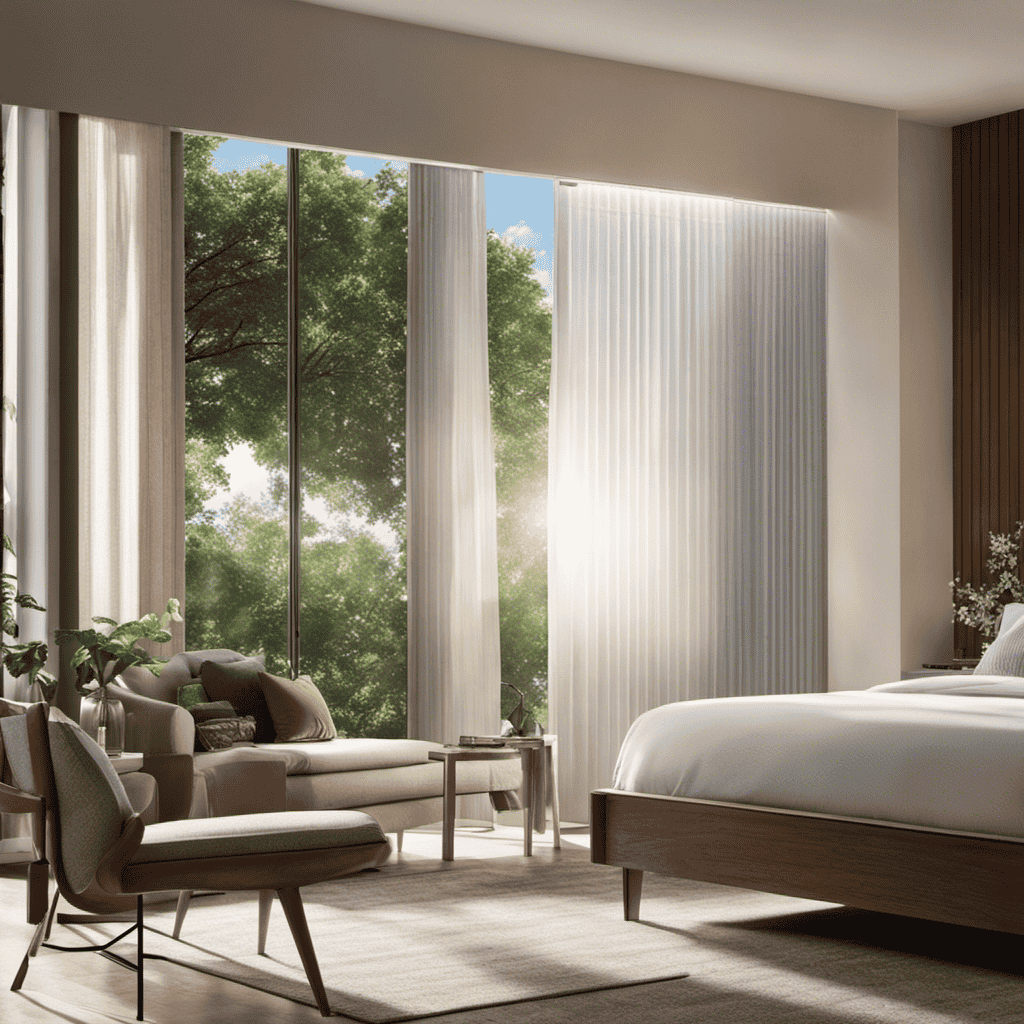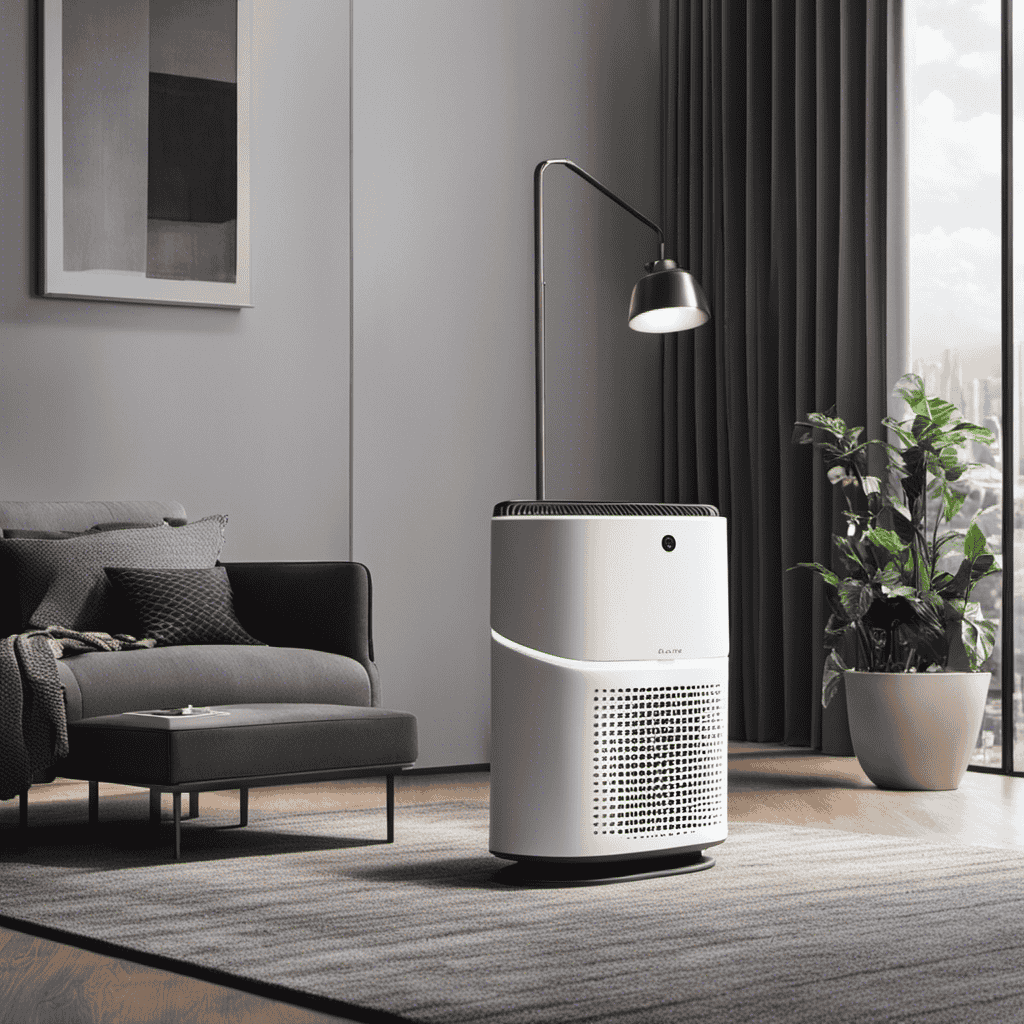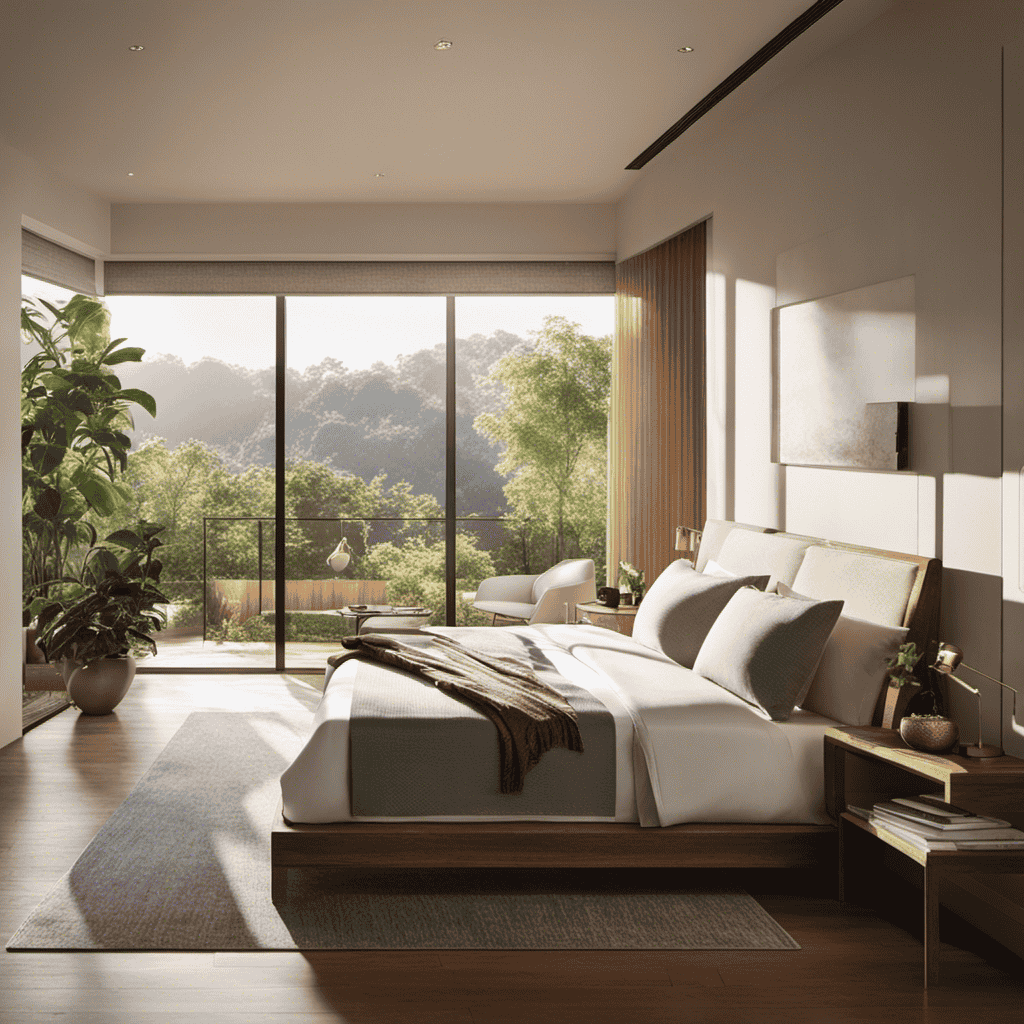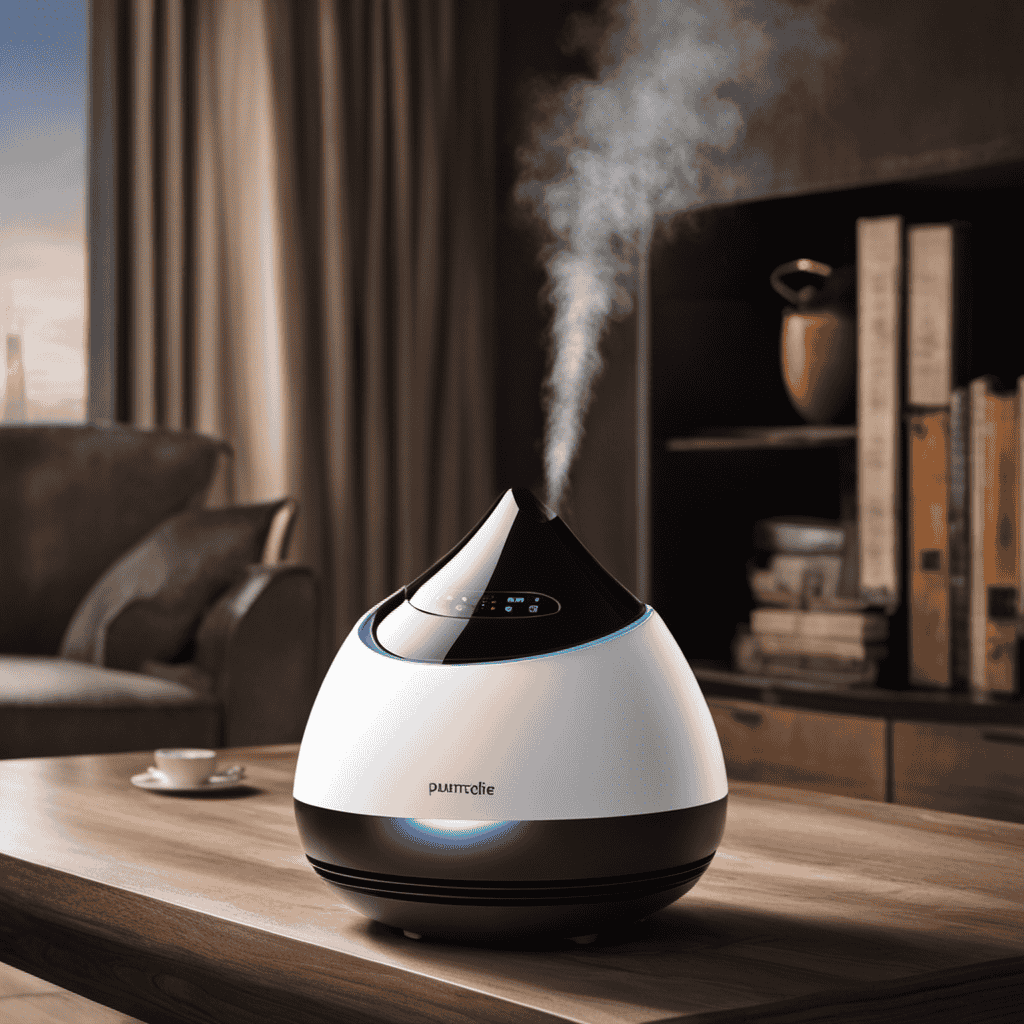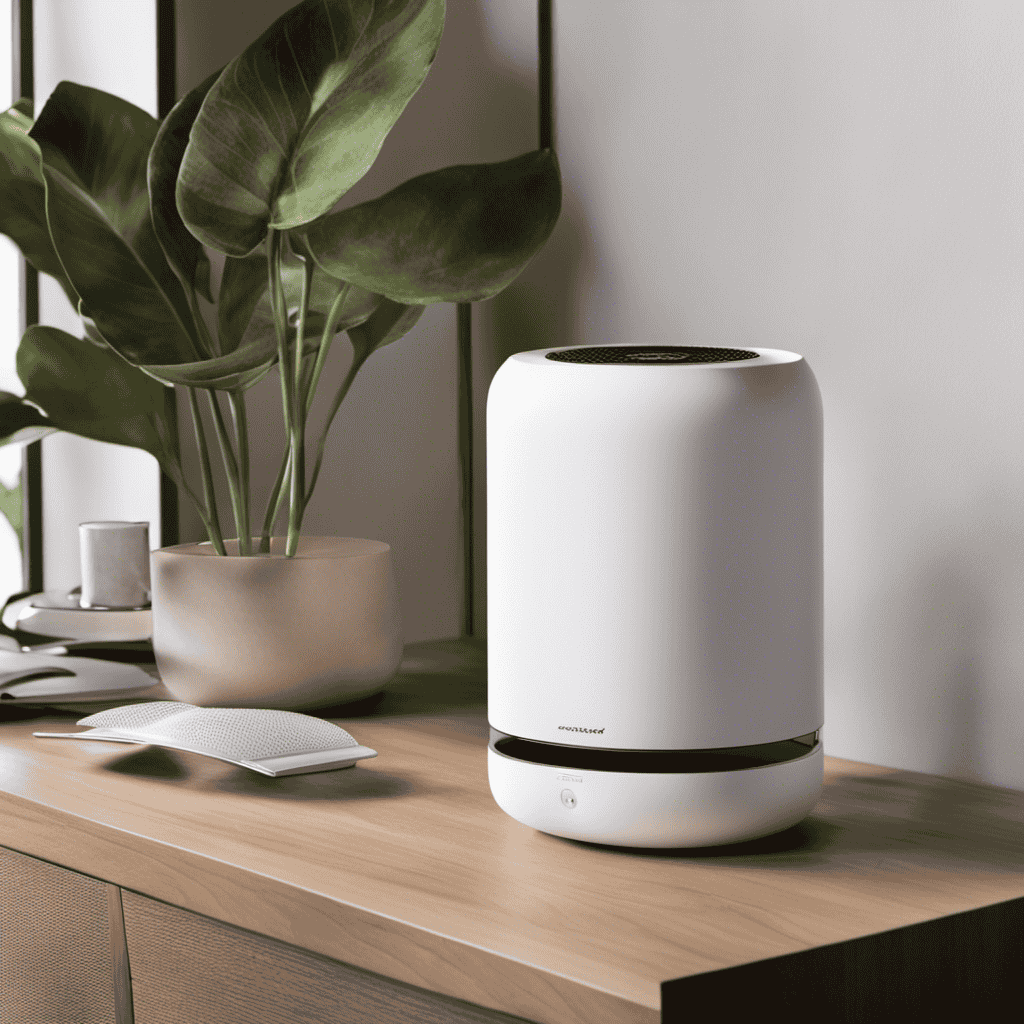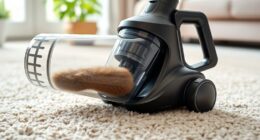I have always been curious about the optimal duration for running my air purifier to maximize its effectiveness. This is a common query for individuals who prioritize their indoor air quality.
In this article, we’ll explore the factors to consider when determining the ideal operating time for an air purifier. By taking into account room size, air quality, and specific needs like allergy relief or odor elimination, we can make informed decisions that promote a healthier living environment.
So, let’s dive in and uncover the truth behind this air purifier quandary.
Key Takeaways
- Follow manufacturer’s guidelines for recommended operating time
- Most air purifiers are effective for 8-12 hours a day
- Consider the size of the room and air quality when determining operating time
- Running the air purifier in the bedroom at night can provide allergy and asthma relief
Factors to Consider
There are several factors to consider when deciding how long to leave the air purifier on.
One important factor is the noise level of the air purifier. Some air purifiers can be quite loud, especially at higher fan speeds. If you are sensitive to noise or if you plan to use the air purifier in a bedroom or office, it may be best to only run it during the day or when you are not trying to sleep or work.
Another factor to consider is the placement of the air purifier. It is recommended to place the air purifier in the room where you spend the most time, such as the living room or bedroom. This will ensure that you are getting the maximum benefit from the air purifier.
Room Size and Air Quality
The size of your room and the quality of the air can determine how long you should keep the air purifier on. The effectiveness of an air purifier largely depends on its ability to clean the air in a given space.
A larger room may require a longer operating time to achieve optimal air quality, as the purifier needs more time to circulate and filter the air. Additionally, if the air in your room is heavily polluted or contains high levels of allergens, it may take longer for the air purifier to effectively clean the air.
The benefits of clean air are numerous, including improved respiratory health, reduced allergies, and a cleaner living environment. Therefore, it is important to consider both the size of your room and the quality of the air when determining how long to keep your air purifier on. This will ensure that you can enjoy the full benefits of clean air in your living space.
In the next section, we will discuss the recommended operating time for air purifiers.
Recommended Operating Time
You should consider the recommended operating time for your air purifier to ensure optimal air quality.
The maximum operating time for an air purifier varies depending on the model and the size of the room. It is important to follow the manufacturer’s guidelines to get the best results.
Running the air purifier for too long or too short can affect its efficiency and overall performance. According to experts, running the air purifier continuously for 24 hours is not necessary unless you have specific health concerns or live in a highly polluted area.
Most air purifiers are designed to operate effectively for 8-12 hours a day. This allows sufficient time for the air purifier to clean the air and provide the desired health benefits while also conserving energy.
Allergy and Asthma Relief
For allergy and asthma relief, it’s recommended to run the air purifier in your bedroom at night while you sleep. As someone who suffers from allergies and asthma, I can personally attest to the effectiveness of using an air purifier.
Here are four reasons why I believe it’s crucial for allergy prevention and combating air pollution:
-
Filters out airborne allergens such as pollen, dust mites, and pet dander, reducing their presence in the bedroom.
-
Removes harmful pollutants like smoke, smog, and volatile organic compounds (VOCs), improving indoor air quality.
-
Helps to alleviate allergy and asthma symptoms by reducing exposure to irritants that can trigger attacks.
-
Creates a cleaner and healthier sleeping environment, promoting better sleep and overall well-being.
Energy Consumption and Cost
When it comes to energy consumption and cost, finding the optimal duration for savings while balancing efficiency and expense is crucial.
It is important to analyze and consider various factors such as the type of energy being used, the specific appliances or systems in question, and the overall usage patterns.
By carefully assessing these variables and making informed decisions, individuals can maximize their energy savings without compromising on efficiency or incurring unnecessary expenses.
Taking a data-driven approach and staying updated on energy-saving technologies and practices can help individuals make the most effective choices for their specific circumstances.
Optimal Duration for Savings
To maximize savings, it’s best to determine the optimal duration for leaving your air purifier on. Finding the right balance between cost-effective usage and reaping the health benefits is crucial.
Here are a few factors to consider:
- Room size: Larger rooms may require longer operating times to achieve desired air quality.
- Air pollution levels: Areas with higher pollution may necessitate longer usage to effectively clean the air.
- Seasonal changes: Allergens and pollutants can vary throughout the year, impacting the duration needed for purifier operation.
- Lifestyle habits: If you have pets or smokers in the house, longer operating times may be necessary to maintain clean air.
Balancing Efficiency and Expense
To balance efficiency and expense, you should consider factors such as room size, pollution levels, seasonal changes, and lifestyle habits when determining the optimal duration for your air purifier. Finding the right balance between cost-effective operation and clean air is crucial. A longer duration might provide better air quality, but it could also lead to higher energy consumption and increased expenses. On the other hand, leaving the air purifier on for shorter periods may save money, but it may not effectively remove pollutants from the air.
Here’s a table to help you understand the relationship between duration and cost effectiveness:
| Duration | Cost Effectiveness |
|---|---|
| 24 hours | High |
| 12 hours | Moderate |
| 6 hours | Low |
Sleep Quality Improvement
Improving your sleep quality can be achieved by leaving the air purifier on during the night. When it comes to getting a good night’s sleep, the air you breathe plays a crucial role. Here are some air purification techniques that can help enhance your sleep experience:
-
Filter out allergens: An air purifier with a HEPA filter can remove common allergens like dust mites, pollen, and pet dander, reducing the chances of nighttime allergies.
-
Eliminate airborne pollutants: Air purifiers can effectively capture and eliminate airborne pollutants, such as smoke, mold spores, and volatile organic compounds (VOCs), which can disrupt sleep and even lead to respiratory issues.
-
Reduce noise: Look for a quiet air purifier that won’t disturb your sleep with loud fan noise or vibrations.
-
Promote relaxation: Some air purifiers feature built-in aromatherapy functions, allowing you to add essential oils that promote relaxation and better sleep.
By incorporating these air purification techniques into your sleep routine, you can create a cleaner and more peaceful sleeping environment.
Now, let’s explore how air purifiers can also help with odor and smoke elimination.
Odor and Smoke Elimination
By leaving the air purifier on, I can effectively eliminate odors and smoke from my living space.
Air purifier technology has advanced significantly in recent years, providing numerous health benefits. These devices work by filtering out contaminants and pollutants in the air, such as dust, pollen, pet dander, and mold spores. They also have the ability to capture and neutralize odors, including those from cooking, pets, and smoke.
By continuously running the air purifier, it ensures that the air in my home remains clean and fresh. This is especially important for individuals with respiratory conditions, allergies, or sensitivities to smoke and odors.
Additionally, studies have shown that using an air purifier can improve indoor air quality and reduce the risk of respiratory problems.
Maintenance and Filter Replacement
When you regularly change the filters in your air purifier, you ensure that it continues to effectively eliminate odors and smoke. Maintaining a proper maintenance schedule for your air purifier is crucial for optimal performance.
There are different types of filters that are commonly used in air purifiers, each with its own unique function. Here are four key things to consider when it comes to maintenance and filter replacement:
- Check the manufacturer’s guidelines for recommended filter replacement intervals.
- Keep track of the usage of your air purifier to determine when it’s time for a filter change.
- Regularly clean or replace pre-filters to prevent clogging and maintain the efficiency of the main filters.
- Consider the specific needs of your environment, such as pets or allergies, when selecting the appropriate filter type.
Frequently Asked Questions
Can Leaving the Air Purifier on for Longer Periods of Time Have Any Negative Effects on My Health?
Leaving the air purifier on for longer periods of time may not have negative effects on my health. However, it is important to consider the effects of prolonged exposure to air purifiers and compare different brands for their health benefits.
Is It Safe to Leave the Air Purifier on When There Are Pets or Small Children in the Room?
Leaving the air purifier on with pets or small children in the room can be safe, but it’s important to take precautions. Ensure proper ventilation, keep the purifier out of reach, and follow manufacturer’s instructions for optimal usage.
Can the Air Purifier Remove Dust Mites and Other Microscopic Allergens From the Air?
I’ve found that air purifiers can effectively reduce dust mite allergies by capturing and removing microscopic allergens from the air. The efficiency of the purifier depends on factors like its filtration system and maintenance.
How Often Should I Clean the Air Purifier to Maintain Its Effectiveness?
I change the air filter in my air purifier every 3 months to maintain its effectiveness. Using an air purifier in my bedroom has many benefits, such as reducing allergens and improving air quality.
Are There Any Specific Features or Technologies I Should Look for When Choosing an Air Purifier for a Larger Room?
When choosing an air purifier for a larger room, it’s important to consider specific features and technologies. Look for features like HEPA filters and technologies like UV-C light to ensure effective air purification.
Conclusion
In conclusion, determining how long to leave your air purifier on depends on various factors. These factors include room size, air quality, and specific needs like allergy relief or odor elimination.
It is recommended to run your air purifier for at least 8-12 hours a day for optimal results. While it may consume some energy, the benefits it provides outweigh the costs. These benefits include improved sleep quality and reduced asthma symptoms.
Remember, ‘An ounce of prevention is worth a pound of cure’ when it comes to ensuring clean and healthy indoor air.
